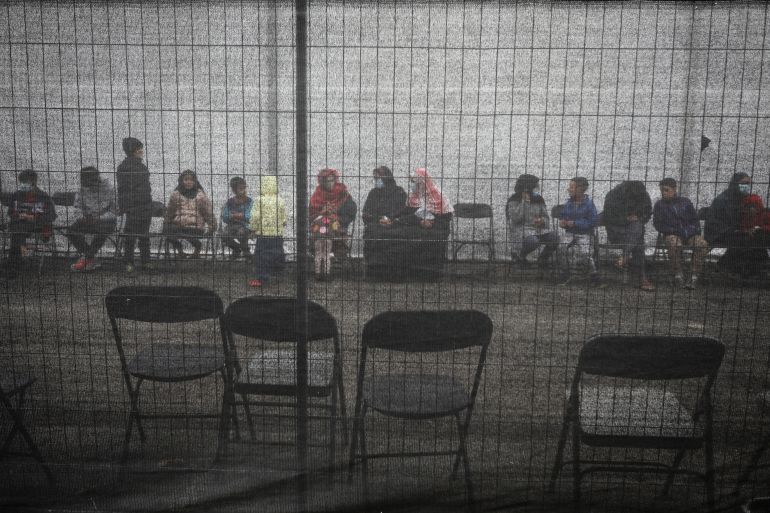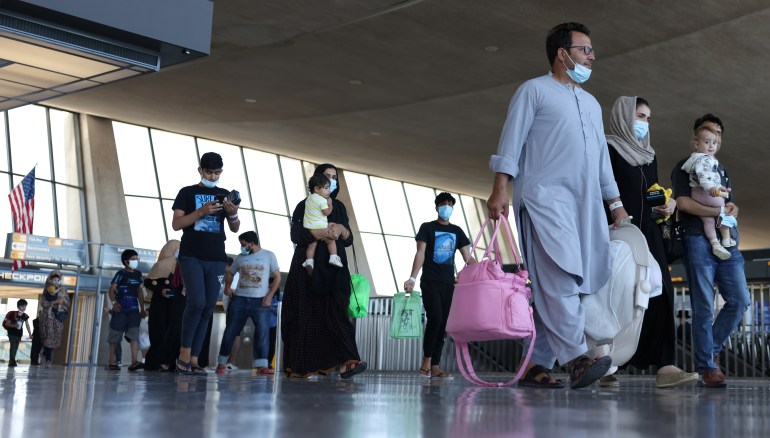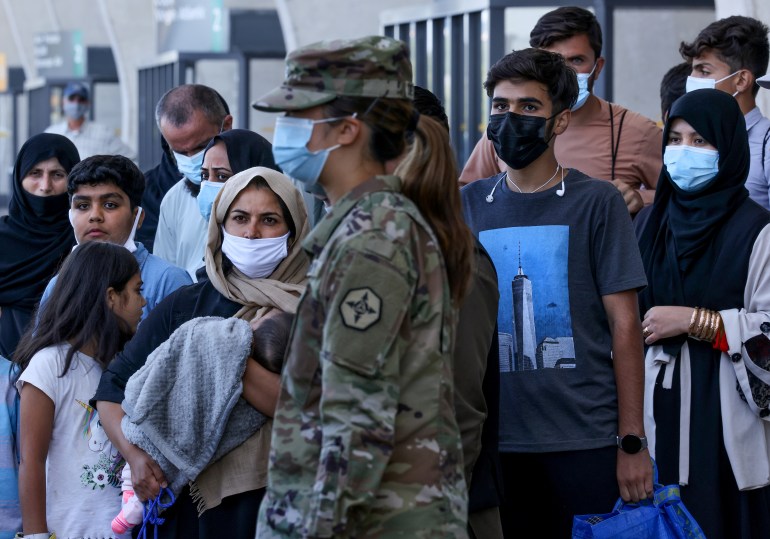‘Feeling of betrayal’: Afghans await US response on parole
Thousands of Afghans remain stranded, with few signs of action by US President Joe Biden’s administration.

San Francisco, California, United States – When Walid Aziz watched Kabul fall to the Taliban last August from his home in California, his first thought was for his father back in Afghanistan.
As a prominent member of the US-backed government, the 57-year-old could be targeted for retaliation, Aziz worried. Soon after they swept into the city, members of the Taliban came to his family’s home and the local mosque, inquiring about his father’s whereabouts, he said.
Keep reading
list of 3 items‘Theft’: Advocates decry US decision to withhold Afghan funds
Who should control Afghanistan’s foreign cash reserves?
On September 24, Aziz placed his hopes in a programme called humanitarian parole, which allows Afghans to come to the United States without a visa for “urgent humanitarian or significant public benefit” reasons. They can then work through various immigration pathways, which can take years to complete, from the safety of the US.
But nearly five months and more than $6,000 in submission fees later, Aziz’s father and 10 family members, now in hiding in Afghanistan, are still waiting for an answer. “All the time I am stressed,” Aziz told Al Jazeera. “I can barely sleep. Even when I sleep, I’m thinking of my family.”
He holds out hope that the applications will eventually be approved. But for tens of thousands of Afghans who are anxiously awaiting a response to their petitions, the odds do not appear to be in their favour.
As of last month, US Citizenship and Immigration Services (USCIS) told Al Jazeera that of more than 40,000 Afghan humanitarian parole applications filed since July 2021, it had denied 930 and conditionally approved just 160. The overwhelming majority has yet to be processed, and USCIS offered no timeline for their completion.
Applicants in limbo
The Biden administration initially identified humanitarian parole as a useful tool for facilitating the evacuation of Afghans, as programmes such as refugee admissions had been hollowed out during the Trump era.
But Afghan advocates and immigration organisations say the Biden administration has left tens of thousands of applicants in limbo as conditions in Afghanistan become increasingly perilous, while overwhelmingly rejecting the small number of applications that have been processed.
“The consensus among legal organisations involved in this work is that we’re not seeing approvals,” said Wogai Mohmand, an Afghan-American immigration attorney who has worked with the group Project ANAR to help Afghans file for humanitarian parole. “It contradicts everything they’ve said about wanting to help Afghans find safety. There’s a feeling of betrayal.”
While the administration can interpret the “urgent humanitarian” reasons at the heart of humanitarian parole with substantial discretion, immigration advocates say that the Biden administration has thus far opted for a restricted interpretation that makes acceptance prohibitively difficult.
One USCIS rejection letter from November 2021, seen by Al Jazeera, states that applicants must demonstrate “severity and imminence of the harm the beneficiary fears”, noting that they can submit evidence such as a letter from a “credible third party” outlining the imminence of the threat.

“The evidentiary standard is absurd,” Kyra Lilien, director of immigration legal services with Jewish Family and Community Services East Bay, an independent nonprofit that deals with refugee resettlement, told Al Jazeera.
“It’s like asking people to provide a letter from the people who are persecuting them.”
Substantial barriers
Even the handful of Afghans who have received conditional approval face substantial barriers.
With the US embassy in Kabul shuttered since August 31, USCIS requires Afghans to relocate out of Afghanistan to a country with an active US embassy before the parole process can be completed. This can mean months spent waiting for information in another country, with no timeline for approval or denial. “The waiting is unbearable,” Lilien said.
Last week, Afghans in Abu Dhabi held a protest, demanding answers on their resettlement after months in limbo since they fled Afghanistan.
In some cases, USCIS does not include an explanation when it issues rejections, leaving applicants to wonder what they might have done differently. “Usually USCIS will cite something in the evidence you sent,” immigration attorney Greg Siskind told Al Jazeera. “But nobody is even getting a reason for their denial.”
In a statement, USCIS noted that the number of Afghan parole applicants is 20 times larger than the total number of applications it receives in a typical year, and that the number of staff working on parole cases has “dramatically increased”.
But immigration attorneys don’t believe this is a convincing explanation for the slow rate of processing. “They’ve received millions of dollars in processing fees and increased their staff. Claims of capacity feel like an excuse not to accept people,” Mohmand said.

Siskind concurred, saying that capacity issues might contribute to processing times, but cannot explain why the vast majority of applicants are being denied. “The rejection rates speak for themselves,” he said.
Many have called for an approach that would focus on humanitarian conditions in the country, rather than requiring individuals to show that they are being specifically targeted. “A focus on individual circumstances misses the mark completely,” Lilien said. “The whole population has been left behind.”
Calls to reverse course
Afghan-American advocacy groups say the Biden administration’s approach to parole ties into larger problems with the American approach to Afghanistan, noting that US sanctions and a decision to freeze billions of dollars in Afghan assets have pushed millions of Afghans towards starvation.
On February 11, the Biden administration announced that it would split $7bn in frozen Afghan central bank assets between humanitarian aid and compensation for families of 9/11 victims – a decision that will deal another blow to the country’s struggling financial system. The advocacy group Afghans For A Better Tomorrow called the move “shortsighted” and “cruel”, adding that it would “serve to worsen a catastrophe in progress”.
Earlier this month, 44 Democrats joined with the entirety of the Republican caucus to defeat a proposal to study the impact of US sanctions and the cash freeze on the humanitarian situation in Afghanistan.
“We believe that this study would reveal what many of us already know: America’s continued strangulation of the Afghan economy is costing countless lives every day,” Halema Wali, co-founder of Afghans For A Better Tomorrow, told Al Jazeera. “The vote … underscores how little value the United States has placed on Afghan life.”
Advocates have expressed hope that as long as most parole applications have yet to be processed, the Biden administration could still reverse course and take in a greater number of Afghans.
“The United States owes them refuge, safety and dignity without further delay,” Wali said. “Every day is a delay they cannot afford, because it may cost them their lives.”